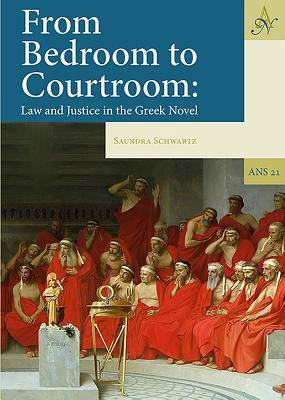
Bedankt voor het vertrouwen het afgelopen jaar! Om jou te bedanken bieden we GRATIS verzending (in België) aan op alles gedurende de hele maand januari.
- Afhalen na 1 uur in een winkel met voorraad
- In januari gratis thuislevering in België
- Ruim aanbod met 7 miljoen producten
Bedankt voor het vertrouwen het afgelopen jaar! Om jou te bedanken bieden we GRATIS verzending (in België) aan op alles gedurende de hele maand januari.
- Afhalen na 1 uur in een winkel met voorraad
- In januari gratis thuislevering in België
- Ruim aanbod met 7 miljoen producten
Zoeken
Omschrijving
From Bedroom to Courtroom argues that the fictional trial scenes in the Greek ideal romances reflect Roman legal institutions and ideas, particularly relating to family and sexuality. Given the genre's emphasis on love and chastity, the specter of adultery looms over most of the scenarios that develop into elaborate trials. Such scenes shed light on the Greek reception of the criminalization of adultery promulgated by the moral legislation during the reign of Augustus. This book focuses on three major novels whose composition coincided with the extension of Roman citizenship when access to Roman courts was granted to increasing numbers of inhabitants of the eastern provinces of the Roman Empire. Chariton's Callirhoe is interpreted as an artifact of the generation after the implementation of the Augustan moral legislation, particularly its criminalization of adultery. Achilles Tatius' Leucippe and Clitophon was created in a legally pluralistic milieu where shrewd sophists learned to navigate and exploit the interstices between the overlapping jurisdictions of imperial and local law. Finally, Heliodorus' Aethiopica, widely regarded as the masterpiece of the genre, adapts the type-scene of the trial to present a series of case studies of different types of government, culminating in the utopian kingdom of Meroe. Through the novels' melodramatic trial scenes, we can begin to see how the opening of Roman courtroom to Greek-speaking citizens of the Roman Empire stimulated dreams of a world in which universal justice under Rome was wed to Hellenism.
Specificaties
Betrokkenen
- Auteur(s):
- Uitgeverij:
Inhoud
- Aantal bladzijden:
- 270
- Taal:
- Engels
- Reeks:
- Reeksnummer:
- nr. 21
Eigenschappen
- Productcode (EAN):
- 9789492444080
- Verschijningsdatum:
- 23/01/2017
- Uitvoering:
- Hardcover
- Formaat:
- Genaaid
- Afmetingen:
- 170 mm x 244 mm
- Gewicht:
- 657 g

Alleen bij Standaard Boekhandel
+ 251 punten op je klantenkaart van Standaard Boekhandel
Beoordelingen
We publiceren alleen reviews die voldoen aan de voorwaarden voor reviews. Bekijk onze voorwaarden voor reviews.









